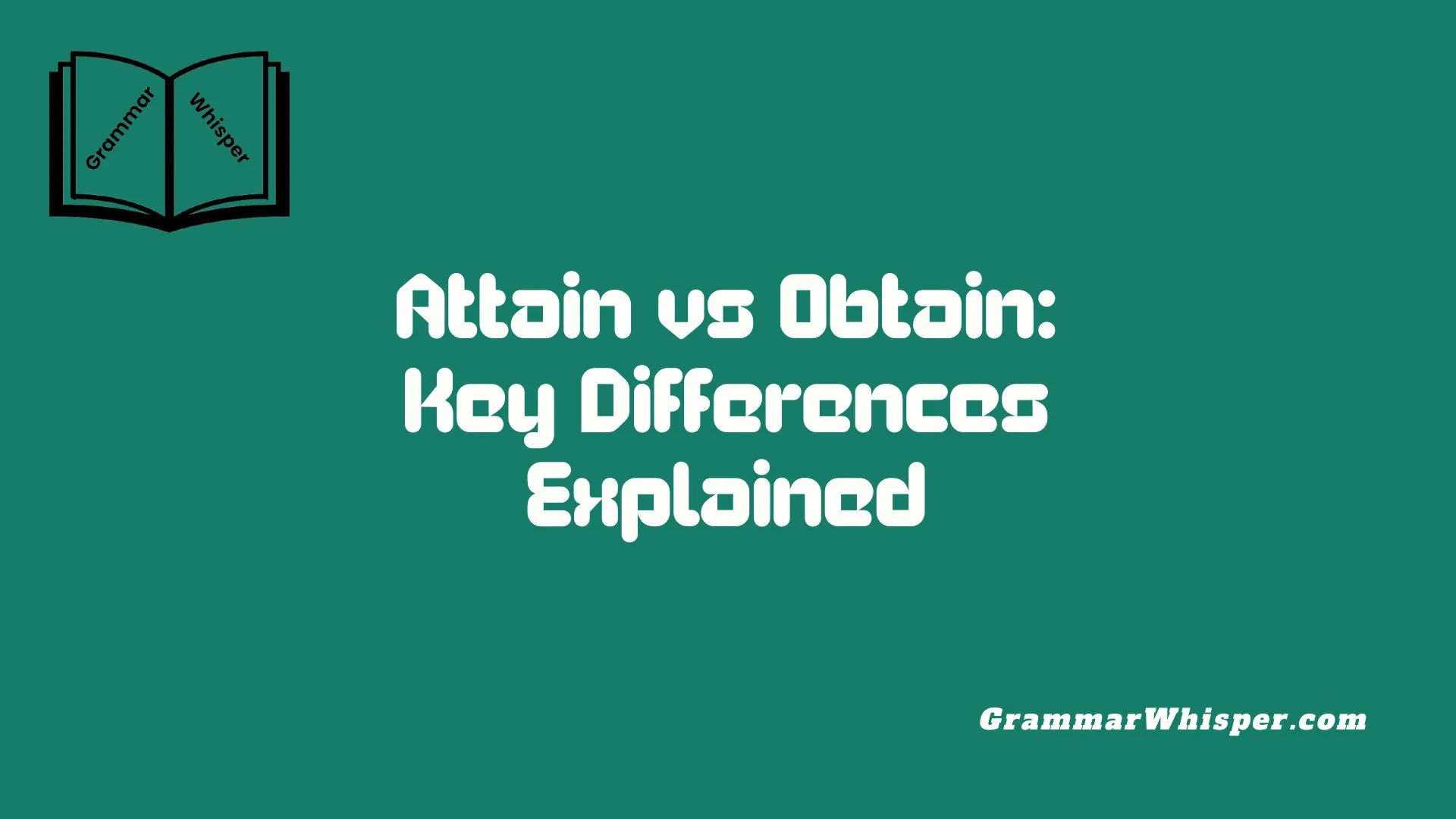these two verbs may seem interchangeable, yet they carry distinct meanings and usages that shape the tone, clarity, and accuracy of your communication and writing. This article is here to help you master the subtle distinctions by exploring their meanings, real-world usage, contexts, and history. With a clear understanding, you will express your ideas more precisely and naturally.
Knowing when to apply each word correctly can greatly shape how your message is received. While attain often relates to achieving goals or reaching a certain level, obtain focuses on getting or acquiring something tangible or intangible. This practical advice is crucial not only for grammar but for effective and confident use of the English language. By recognizing these nuances in various contexts, you gain deeper insight into how these verbs function, helping you communicate with greater precision and flair.
Understanding ‘Attain’ and ‘Obtain’: Clear Definitions
Before diving deeper, it’s crucial to demystify what these words mean in English grammar.
- Attain: To succeed in achieving something, especially after effort or progress. It’s linked with reaching goals, levels of mastery, or milestones.
Obtain: To get or acquire something, often an object, permission, or information. It emphasizes the act of receiving rather than the effort behind it.
In simple terms, attain focuses on achievement and success, while obtain centers on possession and acquisition.
| Word | Core Meaning | Typical Contexts | Example |
| Attain | Achieving goals or status | Education, career, personal growth | “She attained her doctorate.” |
| Obtain | Acquiring or getting | Legal, administrative, physical items | “He obtained a visa.” |
Dissecting ‘Attain’: Achievement, Effort, and Progress
Attain often implies a process involving persistence and effort. It conveys a sense of progression toward something valuable or important. Whether it’s reaching a personal milestone or climbing professional ladders, attainment is about success earned.
Examples:
- “After years of training, he attained mastery in classical piano.”
- “The company attained its sales targets for the third quarter.”
- “She worked hard to attain fluency in French.”
This word carries motivational weight. When you say someone has attained something, you recognize the work behind it. It’s not just about possession; it’s about triumph.
From Goals to Mastery: The Journey of Attainment
The journey to attainment often requires dedication, discipline, and steady progress. This verb ties into goal-setting theories in psychology, emphasizing deliberate effort.
Think of attaining as a climb:
- You set a target (e.g., a promotion).
- You put in consistent effort.
- You reach the target after overcoming challenges.
This process is why attain appears frequently in educational and professional contexts, highlighting accomplishment.
‘Attain’ in Action: Real-World Applications
Let’s consider real-life examples where attain fits perfectly:
- Education: “Students strive to attain academic excellence.”
- Career: “She attained the position of CEO after 15 years.”
- Personal Development: “One can attain inner peace through meditation.”
Each example underscores the active, effortful path to success. Attain connects with growth and achievement.
Exploring ‘Obtain’: The Act of Acquisition
In contrast, obtain highlights the action of getting or receiving something. It’s more transactional and less focused on effort or achievement.
Common objects obtained include:
- Permissions: “He obtained a license to drive.”
- Physical items: “They obtained supplies for the expedition.”
- Information or data: “Researchers obtained results from the experiment.”
Unlike attain, obtain does not inherently imply effort or progress – just the act of acquisition.
‘Obtain’ in Everyday Life: Practical Examples
Obtain frequently appears in legal, administrative, and routine scenarios. Here are some typical sentences:
- “You need to obtain a passport before traveling abroad.”
- “The team obtained funding for their project.”
- “She obtained access to the confidential files.”
Notice how the focus is on the successful receipt or access to something, regardless of the difficulty involved.
Attain vs Obtain: When to Use Which?
Understanding the subtle differences in meaning helps you choose the right word for the right context. Below is a side-by-side comparison to guide you:
| Aspect | Attain | Obtain |
| Focus | Achievement, effort, reaching goals | Acquisition, getting possession |
| Context | Education, personal growth, milestones | Legal, administrative, physical items |
| Tone | Formal, motivational | Neutral, practical |
| Example | “Attain success” | “Obtain a permit” |
Quick Tips:
- Use attain when emphasizing success after effort.
- Use obtain when focusing on getting or receiving something tangible or intangible.
Language Nuances: Formal vs Informal Usage
Both verbs appear in formal writing, but attain often sounds more polished and inspirational. Obtain fits well in technical, legal, or everyday conversations about acquiring something.
- In academic writing: “Students must attain proficiency in critical thinking.”
- In legal documents: “Applicants must obtain approval from authorities.”
Understanding these nuances improves your writing style and clarity.
Interchangeable Cases: When ‘Attain’ and ‘Obtain’ Overlap
Sometimes, both words seem possible, but the meaning shifts slightly:
- “She attained/obtained her certification.” Here, attained highlights the achievement and hard work; obtained stresses possession of the certificate.
Always consider what you want to emphasize: effort and success or the simple fact of possession.
Etymology and Origins: Historical Roots of ‘Attain’ and ‘Obtain’
Both words trace back to Latin:
- Attain: From attingere, meaning “to reach or touch.”
- Obtain: From obtinere, meaning “to hold, occupy, or get.”
These roots reveal how attain developed into a verb about reaching goals, while obtain centered on acquiring or holding something.
Practical Tips to Remember the Difference
- Think attain = achievement, success, effort.
- Think obtain = get, receive, acquire.
Remember:
- If you’re talking about working hard to reach something, use attain.
- If you’re talking about getting or collecting something, use obtain.
Summary of Key Differences Between Attain and Obtain
| Feature | Attain | Obtain |
| Meaning | To achieve through effort | To get or acquire |
| Typical usage | Goals, milestones, success | Possessions, documents |
| Connotation | Positive, motivational | Neutral, transactional |
| Common contexts | Education, career, growth | Legal, administrative |
Final Thoughts
Choosing the right word sharpens your message. Use attain when highlighting effortful success. Reach for obtain when focusing on the act of acquiring or receiving something. Mastery of these subtle distinctions enhances both your written and spoken English, making your communication clearer and more impactful.
Additional Resources for Mastery
- Merriam-Webster Dictionary: Attain, Obtain
- Oxford English Dictionary
- Cambridge Grammar of the English Language, by Huddleston & Pullum
- Corpus of Contemporary American English (COCA) for usage examples
Quote to Remember: “Words are the clothes we dress our thoughts in; choose them well.”
This comprehensive guide provides you with clear, actionable insights on when and how to use attain vs obtain correctly, ensuring your language reflects your true intent every time.
FAQs
What is the main difference between attain and obtain?
The main difference is that attain focuses on achieving something through effort or progress, like reaching a goal, while obtain means to get or acquire something, often without emphasizing effort.
Can attain and obtain be used interchangeably?
Sometimes they overlap, but not always. Use attain when talking about success or achievement, and obtain when referring to getting or receiving something tangible or intangible.
Is attain more formal than obtain?
Both can be formal, but attain often sounds more inspirational or motivational, while obtain is more neutral and commonly used in legal or technical contexts.
How do native speakers decide between who else and whom else?
Native speakers choose based on grammar rules – who else is used as a subject, and whom else as an object. But in everyday speech, who else is more common, and confusion often arises.
Can you give examples of attain and obtain in sentences?
Sure!
- Attain: “She attained her goal after years of hard work.”
Obtain: “He obtained the necessary documents for the application.”











